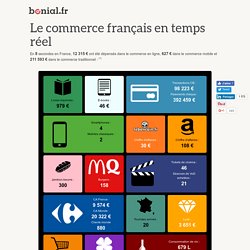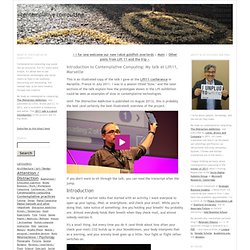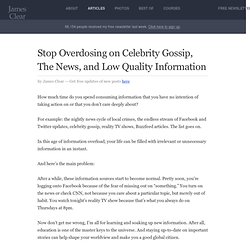

Le commerce français en temps réel- Bonial.fr. (1) Chiffres du commerce de détail : (2) Livres imprimés : (3) E-Books : (4) Transactions monétaires : page 4 (5) Ventes de téléphones mobiles : GfK (6) Le Bon Coin : (7) Amazon : (8) Sandwichs jambon-beurre : page 5, Gira (9) Burgers Mc Donalds et Quick : Gira (10) Cinéma : CNC, Médiamétrie (11) Carrefour : (12) Tourisme : (13) Luxe : Bain & Company (14) Alimentation : www.economie.gouv.fr/files/directions_services/dgccrf/documentation/dgccrf_eco/dgccrf_eco21.pdf, page 2 (15) Jeux d'argent et de hasard : AFP (16) Consommation de vin et fromage : OIV, CNIEL.

Introduction to Contemplative Computing: My talk at Lift11, Marseille. Introduction In the spirit of earlier talks that started with an activity, I want everyone to open up your laptop, iPad, or smartphone, and check your email.

While you're doing that, take notice of something: Are you holding your breath? You probably are. Almost everybody holds their breath when they check mail, and almost nobody realizes it. It's a small thing, but every time you do it (and think about how often your check your mail) CO2 builds up in your bloodstream, your body interprets that as a warning, and your anxiety level goes up a little.
Via flickr An ancient, subconscious physical system accidentally triggered by a modern technology illustrates how complicated-- and problematic-- our relationships with information devices have become. Via flickr This often feels like an inevitable state of affairs. Via flickr More recently, neuroscientific explanations for our addiction to technology have become popular. Via flickr and by applying some very old ideas to this problem... via flickr.
The News is a Waste of Time: What Kind of Food is Your Brain Eating? How much time do you spend consuming information that you have no intention of taking action on or that you don’t care deeply about?

For example: the nightly news cycle of local crimes, the endless stream of Facebook and Twitter updates, celebrity gossip, reality TV shows, Buzzfeed articles. The list goes on. In this age of information overload, your life can be filled with irrelevant or unnecessary information in an instant. And here’s the main problem: After a while, these information sources start to become normal. Now don’t get me wrong, I’m all for learning and soaking up new information. But it is becoming dangerously easy to consume low quality information and convince yourself that it’s normal and good, when it isn’t helping you live a better life at all. Circles of Concern vs.
In Steven Covey’s best-selling book The 7 Habits of Highly Effective People, he covers the difference between Circles of Concern and Circles of Control. Graphic by James Clear. And that is the main point…